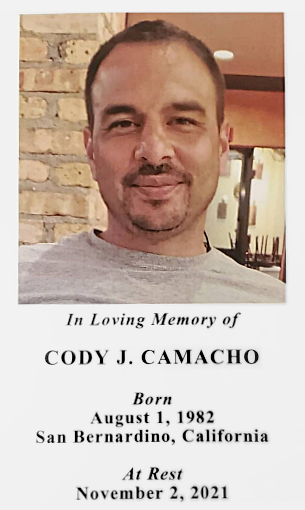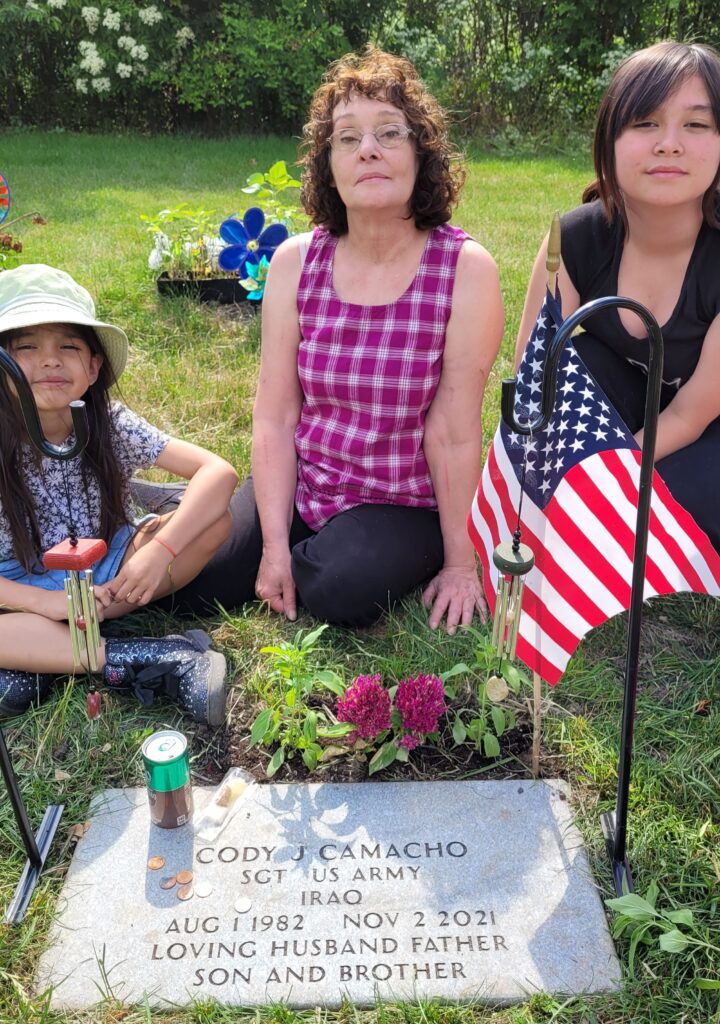Editor’s note: Green Star Families are families who have lost a veteran by suicide.
T
wo or three days after my son Cody Camacho, an Army veteran, took his own life, I was sitting at his dining room table with a good friend of his who had been talking with him about opening a business—but would now serve as one of his pallbearers. We were trying to put together the pieces, repeating over and over what everyone said: “But he just wouldn’t leave his girls.” Then a small package arrived, which we opened—it was Cody’s new prescription for risperidone from Hines VA Hospital in Chicago.

I remembered seeing bottles of pills in the basement where Cody kept many of his things. We went down there and counted them. Seven pills left out of a bottle of fifteen risperidone, and the same for a bottle of aripiprazole, the generic form of Abilify. These were antipsychotics that Cody had been recently prescribed for a particularly serious bout of PTSD symptoms.
After looking these drugs up, and finding they both had black box warnings for suicidal ideation, as well as many other side effects, Cody’s family and friends soon came to the conclusion that these drugs had played a role in Cody’s death. A father whose own Navy son took his life expressed my feelings best after hearing my story:
“Cody got up every day for close to twenty years and handled his PTSD, then was on these drugs for about six weeks and was gone.”
Two days after the funeral, his wife and I went to a meeting with his therapist at the Hines VA Medical Center and the head of their suicide program. We thought they would want to hear what we thought about these drugs, that there would be some kind of investigation into Cody’s death. This was not the case. They did not respond to anything we said about the role of these drugs. They gave us brochures about grief counseling and told us that we just had to accept it.
I knew that I was unwilling to just accept this. My son was not suicidal before taking these drugs, and I wanted to do something about this issue, convinced that there must be other families who had lost veterans in the same way. I wrote letters to various legislators. I spent hours researching, trying to find at least newspaper accounts of suicides similar to Cody’s that might list the names of family members. I looked at statistics from the Veterans Administration. I read studies about these drugs. What I learned shocked me. Despite the tremendous number of post-9/11 veterans who resorted to suicide, there appeared to be little investigation into their deaths. Despite the widespread use of psychiatric drugs to treat veterans with PTSD by the VA, many of which have black box warnings for suicidal ideation, the VA does not appear to even keep a list of veterans who have taken their own lives after being prescribed these drugs by the VA. Why would anyone give drugs that may cause suicidal thinking to a population with such a high rate of suicide?
I knew at the beginning this would not be an easy fight. The use of these drugs by the VA is not a new issue, but I am a persistent person. Then, as I was feeling dejected about not being able to make a dent in this problem, close to three years after Cody’s death in 2021, a friend offered to hand-deliver a letter from me about Cody’s death to the head of the Veterans Administration. It would not really change anything but felt like a small step forward to me.
Below is the letter I wrote. I should have been more specific in asking for action by the Veterans Administration. I want the Office of the Inspector General to investigate the circumstances of Cody’s death, the quality of the treatment he received, and the role that antipsychotic drugs played in his suicide. More importantly, if the Veterans Administration is sincere in wanting to reduce veteran suicides, the first place to start is to collect information following these deaths to try to better understand the causes. Investigating Cody’s death is not enough—he was only one of tens of thousands we have lost. Real investigations of veteran suicides could point the way to effective treatment, not more drugs. You can’t fix a problem that you don’t understand.
 Cody deserved better treatment when he showed up at the VA emergency room in a severe PTSD crisis, in a state of extreme anxiety and fear. I wish that somewhere in his medical records was a thorough evaluation of his mental state, as well as an “informed consent” document signed by him, testifying that the side effects of these drugs had been explained to him. Other families should not have to continue to experience the trauma of losing their beloved veterans the way thousands of us have. I remember well that very young man leaving for Iraq who told me about the contract he made with the federal government that he was honorably upholding. He was put in harm’s way by the decisions of the federal government and suffered for it for close to twenty years. When will the government uphold its end of the bargain by providing effective mental health care for veterans?
Cody deserved better treatment when he showed up at the VA emergency room in a severe PTSD crisis, in a state of extreme anxiety and fear. I wish that somewhere in his medical records was a thorough evaluation of his mental state, as well as an “informed consent” document signed by him, testifying that the side effects of these drugs had been explained to him. Other families should not have to continue to experience the trauma of losing their beloved veterans the way thousands of us have. I remember well that very young man leaving for Iraq who told me about the contract he made with the federal government that he was honorably upholding. He was put in harm’s way by the decisions of the federal government and suffered for it for close to twenty years. When will the government uphold its end of the bargain by providing effective mental health care for veterans?
The following is the letter I sent to the head of the VA:
* * *
March 11, 2024
Dear Secretary McDonough:
Thank you for taking the time to read about the life and death of my son, Cody Camacho, who took his life on November 2, 2021 after close to 20 years of struggling with severe PTSD from his service in Operation Iraqi Freedom, 2003-2004. I last saw Cody in August 2021, and he was doing well, both physically and mentally. He then began experiencing severe PTSD symptoms which seemed worse than in the past.
He went to the Hines VA at least once a week during the last six weeks of his life, including one trip to the emergency room, and though he had resisted using these drugs in the past, agreed to be treated with two antipsychotics, first aripiprazole, commonly known as Abilify, and then, risperidone. Both of these drugs have black box warnings for suicidal ideation. They both have many well known side effects that seem like they would not be appropriate for those with PTSD, such as tardive dyskinesia, symptoms of which Cody described to me when I suggested taking his dogs for a walk when he felt anxious, saying he did not like to be in public because his arms and legs moved weird and he did not want people to think he was crazy. He said he felt the need to run at these times and could not stop. After being switched to risperidone, Cody took seven pills—we found the bottle after he died and counted them—and shortly after starting this new drug, he bought his children McDonald’s for dinner, called his wife at work, then took a gun and went to a hotel room.
The first thing all his many friends said after learning of Cody’s death was “He would never leave the kids.” It was my first thought. Cody was the devoted father of two young daughters, Desiree and Calina, and his life centered around them. He was someone who was very outgoing and loved people. He was someone people turned to when they were troubled, including many veterans he served with. He was vice commander of his American Legion chapter in Des Plaines at the time of his death, and was active in other community activities and his church. He was well known and well loved in his community, his funeral was huge and many contributed to this all day affair. He was just not suicidal before this time. His VA medical records also reflect this, that he was not considered at risk of suicide—his last appointment was about three days before he died. We firmly believe that the medication he was prescribed by the VA played a role in his death.
I went to Chicago to be with his wife immediately after his death, and the house was full of people for the whole week. I talked to many of his friends, people he was close to for 30 years, who reported his strange behavior right before he died. He told them he was marked, that someone was after him and was going to kill him. Cody had never acted like this before. His PTSD symptoms were primarily anxiety.
The morning after the funeral, his wife received a call from a VA neuropsychologist, who had been unable to reach Cody to set up an appointment. Unfortunately, he was already dead. Cody was driven to the Hines VA emergency room by another veteran on September 27 because of his extreme anxiety and strange behavior, where he was briefly seen and given Abilify, then sent home. Reading his medical records, I learned that during the time between his emergency room visit and his death, Cody visited the VA numerous times, for appointments with his regular counselor or with the psychiatrist prescribing these drugs. I did not see any real evaluation of what was happening to him, or any treatment plan. In fact, throughout his medical records I did not notice any specific treatment plan for PTSD, although he did attend some group events on PTSD management. Notes from his office visits mainly consisted of discussing family issues. There was little talk of Iraq or the source of his PTSD at all. Cody was so scared during this time, he sought help. Over and over. He wanted to get better.
Cody joined the Army on his 18th birthday in 2000, and was deployed to Iraq with the initial invasion. He was in the signal corps and provided communications support at the Abu Ghraib prison for most of his deployment. He turned 21 at the Abu Ghraib prison. After returning from Iraq, Cody began having frequent and severe panic attacks and constant anxiety, he had difficulty in crowds and finding employment. He then went back to the Army, and had various assignments in the reserves in human resources, serving as the administrator for reserve units. He served in total about 17 years, attaining the rank of sergeant with many awards and commendations. He served honorably. He spent most of his adult life struggling with PTSD. He deserved better treatment, actual treatment, not drugs that many, including mental health professionals, think questionable in the treatment of PTSD.
Most troubling to me is the lack of information I have been able to find on cases where veterans were prescribed these drugs and then committed suicide. I am not a medical professional, but I am a professional, a retired college professor. I am a researcher. These drugs, with known side effects, continue to be used “off label”, and there does not seem to be any body of research concerning how many veterans take their lives while on medication prescribed by the VA. No one investigated Cody’s death. He did not even have an autopsy. I often wonder, had we not told them Cody was dead, whether the VA would even know.
Sincerely,
Jeri L. Reed
 ***
***
Editor’s Note: The Gruntstyle Foundation, a non-profit led by veterans, is collecting stories by veterans and their families to support its “War Cry For Change: The Revolution to Reclaim Veteran Mental Health” initiative. Mad in America is supporting this initiative by publishing these stories and archiving them on our site. Members of the veterans community, including their families and friends, can submit their story here.















My condolences on the loss of your son, Jeri. And I can tell you, the antipsychotics are a very evil class of drugs. You can see a self portrait I did just after I was put on them, in the MiA art section. They made my head feel like it had a hole blown into it … they create chaos in your brain, thus the chaotic abstract impressionist painting style, of that self-portrait.
Plus, the antipsychotics can create “psychosis” and “hallucinations,” via anticholinergic toxidrome. They can also create the “negative symptoms of schizophrenia,” via neuroleptic induced deficit syndrome.
https://en.wikipedia.org/wiki/Toxidrome
https://en.wikipedia.org/wiki/Neuroleptic-induced_deficit_syndrome
The unethical and incompetent doctors use them to cover up easily recognized malpractice, and some (maybe all?) religions use them to cover up child abuse … which seems to be the primary actual societal function of both the psychological and psychiatric industries … and all this illegal child abuse covering up is by DSM design.
https://www.indybay.org/newsitems/2019/01/23/18820633.php
https://www.madinamerica.com/2016/04/heal-for-life/
https://books.google.com/books?id=xI01AlxH1uAC&printsec=frontcover&source=gbs_ge_summary_r&cad=
0#v=onepage&q&f=false
https://www.psychologytoday.com/us/blog/your-child-does-not-have-bipolar-disorder/201402/dsm-5-and-child-neglect-and-abuse-1
As one who had all the distress of 9/11/2001 blamed on a “chemical imbalance” in my brain alone … I finally learned, when picking up my psychologist’s medical records. Which was, of course, my former psychologist’s insane belief system, since distressing events cause distress, dah.
I most definitely stand against, drugging our veterans with these horrendous drugs. But as an ethical small American banker’s daughter, I also stand against the … seemingly never ending … globalist bankers’ wars.
https://www.youtube.com/watch?v=BXeAIxK7rY4
I’m so glad we have veterans and veteran’s family members sharing their stories. Thank you, Jeri. I’m a former Chicago gal myself.
Report comment
Thanks for your research. I’m sure you’ll find the 110th Congressional Hearing “The Truth About Veterans Suicides” to be quite educational. Nobody knows “The Truth About Veterans Suicides” better than the 110th Congress who wrote the book on SSRI-Induced Suicides, 16 years ago..
Simply google “The Truth About Veterans Suicides” and read the 110th Congressional Hearing.
Beverley Susan Melampy
Veteran’s Suicide Advocate
Survivor H.R. 841
Report comment
If I loved my child, I don’t think I could ever brain wash them with a delusional patriotism which is a form of ideological social conditioning of the brain, a means of control through the illusion of nation which is just a word and a concept on the one hand, and the object of a power grab by every political and cultural faction fighting to control the meaning of the citizen, i.e. the structure and function of the socially conditioned citizen, the once natural and perfect creature conditioned into a functionary of a blind mechanical total social historical global system that has already destroyed the Earth and humanity and the future of nature and the whole of life, including ourselves and our children.
Soldiers don’t sacrifice their lives: rather, the state and the nation sacrifices them out of institutional self-interest, and does so first by conditioning their brains and distorting their emotions and natural instincts with ideologies about nationhood, patriotism, the honour of warfare, and as conditioned children ourselves, as parents we reperpetuate the hegemonic violence of false and ugly, highly destructive and divisive ideology which divides humanity into factions vying for superiority and we continue this process by being a good citizen and continuing the brain washing process down the generations.
If we weren’t ourselves so blinded by our social conditioning and our ideological stupidities, we would see that there is no nation to fight for, that the nation is really just a hegomonic tool to dominate a captive human population who really have lives no more meaningfu then a factory farm animal except for empty piggy treats. This our children understand and that is a real driving force behind a real spiritual and emotional collapse of a generation which cannot be seen behind the smokescreen of psychiatry and a society which blames it on the brains of our children. These children will never rally behind the flag again if there were a war, and conscription would be impossible, because most of them realize that there is nothing but a vampire state to fight for. They will one day prefer to burn and destroy the societies that destroyed their lives and their Earth. Because we’ll stand with the Earth, and who are you that would be against us? Are you too not the Earth? Or are you something other, something false, something illusory, something social or cultural or national, i.e. mere words?
We are the Earth. It’s only a very sick creature of nature that considers itself above nature because it is nature. And you can’t kill nature without slaughtering yourself eternally.
Report comment
No One, the name suits you.
Report comment
Sorry for your loss Ms Reed.
You write;
“These were antipsychotics that Cody had been recently prescribed for a particularly serious bout of PTSD symptoms.”
I’m not sure these drugs have any ‘anti psychotic’ properties, that was part of a repurposing/marketing change. There are some good articles here about that process from tranquillisers/neuroleptics/anti psychotics…… Someone may be able to direct you to an author who has covered it.
I find myself wondering about the effect of calling something that which it is not. If I take a drug and expect it to remove any psychosis (as I understand it to be) what are the consequences when it does nothing of the sort? Expectation not met by the effect of neuroleptics which “seize the brain”…..
Good luck with brining these matters to the attention of the authorities.
Report comment
This was a really painful read because it once again reminds me of how America isn’t ready to embrace or enact the changes necessary to facilitate meaningful change. I served 18-years in the Army before being retired by a medical board instead of getting medically discharged. It was a “take it up with the VA after you get out” situation. I did, and a lot of mental health diagnoses soon followed. C-PTSD was one of them. Along with that came a 100% disability rating for mental health. Few people read what that rating means in terms of federal law. So, let me spell it out for all of you. A 70% disability rating for PTSD says something to the effect that the person is prone to periods of violence. And a 100% disability rating describes the veteran as a danger to self and others. It says lots of other disturbing stuff, too. The harsh question is: What was Cody doing with a gun? This is a must have discussion because I’ve been hospitalized five times for suicidal ideation. What’s profound about that is I appear to still have gun rights because none of those psych ward stays resulted in a judge committing me. A doctor or psychiatrist committing you to a psych ward doesn’t take away gun rights, a judge does that when they commit you to stay beyond the typical 72-hour hold period, etc. A judge doing that usually doesn’t happen. The bottom line is that veterans like Cody and me should not have gun rights or access to firearms because of our mental health issues, but as a gun-loving nation, we lack the wherewithal to pass legislation that will help fix the problem. I’m still alive because I keep guns out of the house. I do so because of the allure of how quick and painless my ending can be. I think this story gets it partly right about the antipsychotic problem. I’ve been on these drugs numerous times and refuse to take any more of them. Based on my experience, I don’t think the antipsychotics made Cody suicidal. I think the side-effects did. My trajectory on antipsychotics has been like this. It’s a slow creep as the weeks begin to pass, but my eyes would start twitching. My lips would be smacking like I was eating something when I was not. My tongue would start involuntarily darting around in my mouth. My saliva would nearly totally disappear, which really, really bothered me. I was taking 3-4 naps a day and had no energy. Severe constipation would develop. The constipation was so bad by day 15 on Vraylar that I had blood coming out of my rectum. All of that should sound bad and it is, but the worse part is the inner restlessness that manifests. It drives you insane. It was as I had to keep moving or fidgeting and couldn’t sit still. I no longer wanted to be awake. What’s sheer lunacy is instead of stopping the drugs, the VA wants to further medicate you with Parkinson’s drugs to treat the side-effects from the antipsychotics. That’s my guess on what did Cody in. You’re left to feel that you’re at the end of your rope. On one hand, you have the unrelenting mental illness. And on the other, you have a cure that’s worse than the disease. Access to a firearm makes for a bad ending and what seems like the only solution. I’m truly sorry for and saddened by your loss, Mrs. Reed. But my advice is to make your fight a two-prong one and start advocating to get the guns out of the hands of disabled veterans. A 100% disabled veteran is currently compensated at a rate of approximately $4,000 per month. Many of us also get SSDI. We’re being monetarily compensated for the loss of firearm rights. Another area that needs improvement is allowing a person with severe mental illness to voluntarily surrender their gun rights is only available in three states. And for anyone not paying attention, it was recently included in the spending bill that a veteran who’s so screwed up mentally that they need a fiduciary to manage their finances is back to having gun rights. Veterans organizations helped to pass that. What more can you say when that’s the status quo?
https://www.stripes.com/theaters/us/2024-03-08/senate-veterans-affairs-budget-shutdown-13257003.html
Report comment
My son owned 2 guns that he kept in a locked box because he was a responsible gun owner. He chose hanging instead.
Report comment
The EVERYTOWN report cites 18 veteran suicides per day. 13 of those are by firearms. Nobody can downplay those kinds of numbers.
https://everytownresearch.org/report/those-who-serve/
Report comment
Cody lost his gun card. He just got one that was not registered. Sorry for your loss and mine too.
Report comment
Senator Patty Murray can tell you “The Truth About Veterans Suicides”. She commented at the 110th Congressional Hearing (“The Truth About Veterans Suicides”) on 21 Apr 2008 when Congress discussed 1000s of Military Troops and Veterans lost to Suicide and hidden from Congress after VA Mental Health approved Paxil and Zoloft for the f.d.a as a result of the “Veterans PTSD Treatment and Psychological Readjustment Act of 1991” (H.R. 841). Dr Ira Katz was fired as Chief of VA Mental Health for hiding 11,210 Veteran Suicides and the d.o.d refused to report the number of Troop Suicides for 11 years. (1995-2006)
Nobody knows “The Truth About Veterans Suicides” better than the 110th (and 111th) Congress “Exploring the Relationship Between Medication and Veteran Suicide”
google “The Truth About Veterans Suicides” and read the ‘truth’ as it was told by the 110th Congress 16 years ago.
Beverley Susan Melampy
Veteran’s Suicide Advocate
Survivor H.R. 841
Report comment
Somehow I missed your comment before. I agree, I have looked at past congressional hearings. This is an old issue, it has come up over and over but they are still prescribing these drugs. It has not changed.
Report comment
So sorry for this man and his family.
I think it’s worth noting that the adverse effects he experienced are results of the neuroleptic drugs mechanisms of action. All of the neuroleptic drugs induce Parkinson’s and the tranquilizing effects…also called de-activation and the tranquilizer psychosis…are a side effect of shutting down brain function. Despair is an understandable and common response. So is akathisia.
Dr.Thomas Szasz’s last book is Psychiatry: the science of lies. The entire guild is built on lies. The practitioners lie to patients families insurance companies courts the media and also to medical journals.
The entire industry is a lie, built upon lies, and the profession is practiced by liars.
Report comment
And no doubt they look to Plato and consider it a “Noble Lie”?
“The welfare of the people in particular has always been the alibi of tyrants, and it provides the further advantage of giving the servants of tyranny a good conscience.”
― Albert Camus
Report comment
Dr. Reed: I was sorry to hear about your son’s death. I’ve noticed a desire on the part of psychiatrists to deny PTSD. A guy (Jesse Singal, journalist) wrote an article for the Economist which quoted a psychiatrist. The drift was that it was better not to focus on trauma because then the patient would get stuck in the victim role. I guess it’s better for them to be stuck in the “Stress” role. It might be that the psychiatrist is saying he thinks PTSD is rare and a lot of people who think they have it don’t have it. Not sure. The VA seems to have more belief in PTSD than civilian clinicians do.
When I heard that veterans diagnosed with PTSD were being given antipsychotics, that confirmed a suspicion of mine that people thought to have “real bad” mental health problems get antipsychotics, no matter what condition they have. If their condition is medium-bad they get mood stabilizers. If their condition is not-that-bad, they get antidepressants or antianxiety meds. Or both. All that education condensed down to a bonehead formula. Giving an antipsychotic to someone diagnosed with PTSD is like saying, “You’re just another Schizophrenic.” How does PTSD get confused with psychosis? It seems like psychiatry can’t accept the premise that any mental illness is caused by exogenous bad experience. If the condition isn’t caused by a brain anomaly of unknown origin, it doesn’t exist. Oh, and it has to be impossible to locate in the brain.
I was on Risperdal for decades. My current psychiatrist thought I should try going off it before I got diabetes. I am fine. Too bad somebody didn’t think of that for me 15 years ago. The side effects of antipsychotics demonstrate the contempt society has for The Mentally Ill. I’ll believe psychiatrists care about side effects/permanent damage when I see a few thousand of them demonstrating in front of Pfizer or Astra Zenica (sp). Walk the talk!
Report comment
Thank you for your thoughts. Veterans with PTSD are sometime also slapped with the label “schizo-affective disorder,” as was my son Cody. It is very common. Veterans with PTSD can report auditory hallucinations and paranoia–to me all symptoms of anxiety, terrible anxiety can do terrible things to your mind. I have been told that this diagnosis is used to justify the use of anti-psychotics. I don’t know if you have ever watched the old movie One Flew Over the Cuckoo’s Nest, I watched it not long ago. The film depicts veterans being dosed with older drugs like thorazine and haldol, really the newer antipsychotics are similar–and sort of agree with your estimation that veterans with “real bad” PTSD are treated with these drugs, I’m not sure if it is that simple but seems like it.
Report comment